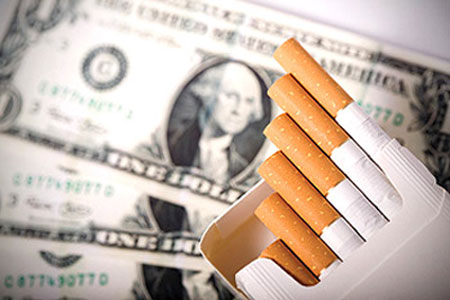Indiana State Rep. Ed Soliday’s big proposed legislation for the year is intended to raise money for roads, but a portion of it has health advocates cheering and smokers concerned.
Soliday’s proposed bill is aimed at raising more revenue to take care of roads and transportation at the state level. Part of that includes diverting all of the gasoline sales tax revenue from the general fund to roads.
To help make up for the loss to the general fund, Soliday has proposed increasing the tax on combustible tobacco from 99 cents, 34th highest in the nation, to $1.99 a pack, which would be 11th in the nation. The money would go specifically to Medicare. Soliday said that about half the costs for Medicare are related to smoking.
“Let’s have smokers pay their fair share,” Soliday said.
Soliday expects the proposed increase would raise $250 million to $300 million, not enough to completely offset the loss of $450 million to $550 million to the general fund by moving the gasoline tax revenue but enough to cover a large portion of it.
Several state health groups have praised the move, saying it will help to reduce the number of people who smoke. Danielle Patterson, the Indiana government relations director for the American Heart Association, called it a “win-win” situation in that it helps raise revenue for the state and will help cut smoking rates.
“We’re finally making a long-term investment,” she said. “The number of students we’ll prevent from smoking and the adults who will quit smoking will have a long-term impact on the state.”
The state last increased the cigarette tax in 2007. Since then, the state’s per capita tobacco use has dropped by 26 percent, according to Hoosiers for a Healthier Indiana, and state revenue from the cigarette tax went from $350 million in 2007 to $411 million in 2014.
Patterson stressed that the state will save billions of dollars in health care spending by reducing the number of smokers. According to the Campaign for Tobacco-Free Kids, Indiana spends $2.93 billion on smoking-related health care. The state ranks 40th in the country for its smoking rate at 21.9 percent.
“That’s not something to brag about,” said Michael Meska, administrative director for respiratory therapy for Franciscan Alliance. “Anything we can do to drive down the smoking rate is beneficial.”
Lake County is above the state average smoking rate at 23 percent, according to the Behavioral Risk Factor Surveillance System survey, and Porter County sits at 21 percent. Newton County leads the state with a 42 percent rate.
Patterson said increasing the cigarette tax will have the biggest impact on young adults ages 16 to 23 and pregnant women, as they are more price-conscious than other groups of smokers.
Irene Boone Phillips, coordinator of the Lake County Community Tobacco Prevention and Cessation Coalition, said the benefit of reducing smoking among young adults is especially important as that will help cut down on people who take up smoking.
“We really want to intercede with that initiation,” she said.
Not everyone is pleased with the proposed increase, however. One local smoker, Jim Smith, of Merrillville, questioned the use of the cigarette tax to help pay for roads, arguing that the money from the toll road lease should have already helped pay for roads.
“Where’s the money going to?” he asked. “It’s not coming up here.”
Smith, who said the proposed tax “sucks,” also questioned why smokers are being targeted again.
“Why are we always penalized?” he said.
Gary Tapley, general manager with Smoke Shop, which has several dozen locations in Northwest Indiana, said the proposal is just another sign of the government picking on smokers.
“It’s become acceptable now for politicians to kick the tobacco industry around,” Tapley said.
He said the price increase will mean Indiana is no longer competitive with Illinois, where many of the customers for Northwest Indiana tobacco shops come from. Tapley said that when Cook County last increased its cigarette tax, business for stores across the border in Indiana increased 25 percent. Tapley estimated that for the tobacco stores sitting along the state border, a majority of their customers come from Illinois.
He argues that by increasing the tax, stores will lose interstate business and will either have to lay off employees or close. In turn, the state won’t raise as much money from the tax as it expects to, Tapley argued.
“It’s going to be nothing good for the state of Indiana,” he said.
However, both Soliday and Patterson say Indiana would pull even with Illinois with the proposed tax rate and would still be less than the rate in Cook County and Chicago, which charge more on top of the Illinois rate. A pack of cigarettes in Chicago come with $6.67 in taxes.
“That is still far less than what people are paying Chicago,” Patterson said.
———–
Copyright 2016 – Post-Tribune, Merrillville, Ind.
Thanks for reading CPA Practice Advisor!
Subscribe Already registered? Log In
Need more information? Read the FAQs
Tags: Sales Tax




